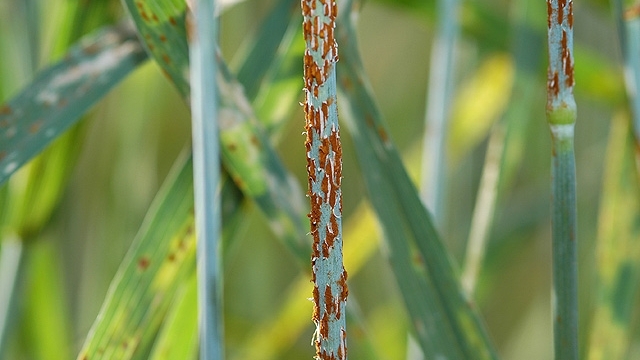Black Stem Rust and Barberry

Black stem rust is an important disease of wheat. It also affects oats, barley, rye, timothy grass, and wild grasses. Black stem rust is caused by the fungus Puccinia graminis—an organism that must alternate between two host plants (a cereal grain and barberry) to complete its lifecycle. A strong breeze can spread black stem rust from one area to another. Infected hosts display reddish-brown lesions on their stems.
From the 1920s through the 1970s, USDA successfully eradicated wild barberry in the Northern United States to control black stem rust. Today, APHIS tests and regulates resistant barberry varieties to maintain the protected areas (54.07 KB). The development of disease-resistant cereal crops and barberry has mitigated the damage of black stem rust.
Black stem rust can damage crops swiftly. Look for:
- Rust-colored or black fungal spore masses on the stems and leaves of wheat, barley, and other host plants. Late stages of stem rust on wheat have black spore clusters.
- Yellow spores on shoes and clothing.
Only purchase and plant resistant and approved barberry varieties (174.51 KB).
Before you move barberry plants interstate into protected areas (54.07 KB), contact your State plant health director or State plant regulatory official. These plants may require inspection and a certificate from APHIS or a State agency.
Learn more about protecting cereal grains from black stem rust.
There is no cure or treatment for black stem rust.
Report Plant Pests and Diseases
Have you seen this pest or signs of pest damage? Immediately report your findings.
Find your State plant regulatory official
Find your State plant health director
Controlling Black Stem Rust
Black stem rust is kept at negligible levels due to resistance in cereal crops and barberry. The interstate movement of barberry into protected areas requires inspection and a certificate from APHIS or a State agency. Contact your State plant health director or State plant regulatory official for more information.
- Map of Protected Areas (54.07 KB)
- Current List of Black Stem Rust-Resistant Varieties (174.51 KB)

